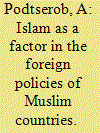| Srl | Item |
| 1 |
ID:
156336


|
|
|
|
|
| Summary/Abstract |
THERE IS A RANGE OF FACTORS behind the foreign policies of Islamic countries, which include their geopolitical status, their international political and economic relations, their ideologies, and the interests of their ruling classes. Islam is one of these factors. Remarkably, while we don't use the phrase "European Christian civilization" to describe Europe, a relatively small continent, we do use the phrase "Arab-Muslim civilization" in reference to Muslim countries with the implication that Islam is a factor in their foreign as well as their home policies.
|
|
|
|
|
|
|
|
|
|
|
|
|
|
|
|
| 2 |
ID:
077506


|
|
|
| 3 |
ID:
146308


|
|
|
|
|
| Summary/Abstract |
SET UP IN 1948, Israel a year later was officially recognized by Turkey that became its closest partner in the Middle East, the region swept by the Arab wars of independence in which Turkey was the only pro-Western state. In 1954, Gamal Abdel Nasser explained that "Turkey, because of its Israeli policy, is disliked in the Arab world." At that time, their ties were mostly symbolic.1
|
|
|
|
|
|
|
|
|
|
|
|
|
|
|
|